Iury Salustiano Trojaborg
A Backyard of Affections
2023Image projected on bathroom curtain while audience enters:
Natureza em Tibirke, Tibirke, Denmark, 2013. © Iury Salustiano Trojaborg
Once audience is seated:
Iury is dressing herself behind curtains. Audience sees her silhouette only.
One navy blue military jacket, military boots, and a blue and green bathing suit are hanging in the space.
Voice off:
In 2018 I was 38 years old and I had been living in Berlin for over 5 years. At that point of my life, I had been in a depressive state for one year. I decided then it was finally time to create a performance where I would tackle the difficult relationship I had with my father my entire life. The first thing I decided was that the performance should be called Stories of a Feud (it appears projected on shower curtain) which would contain short stories, written in the first person, mainly dealing with my rigid upbringing as the daughter of a Navy commander and helicopter pilot in Sao Pedro D’ Aldeia, a small town located two hours away from the state capital, Rio de Janeiro. I spent ten significant years of my childhood there and my father still owns the house where my brother and I grew up. Once I started writing the Sao Pedro stories though, I remembered other meaningful stories that had taken place in other cities, such as Salvador, capital of state the Bahia, where I spent the first year of my life. Then even more stories came to the surface such as those taking place in Aracaju, capital of the state of Sergipe where my father served for two years as the highest maritime authority.
Because these were autobiographical stories told from my point of view, I decided that for the performance, they should be accompanied on the stage by photographs and real memorabilia pertaining to my family. Most of these objects, pieces of clothing, photographs, handwritten letters, drawings, cassette tapes, etc., are now with my father in the old family house, so I sent him a message to check the possibility of getting access to this material. Here’s the answer I received from him:
Performer plays WhatsApp audio message sent by Sonilon on October 23rd 2018 04:11am:
Iury, o que eu quero dizer é o seguinte, boa noite, eu tenho muita coisa para fazer, cara, é… a sua prioridade não é a minha prioridade, não que eu não queira te ajudar, agora você me faz uma porção de pergunta, quer uma porção de coisa antiga, eu tenho que revirar muita coisa, eu não sei qual é a sua ideia, eu não entendo perfeitamente essa ideia de performance, são umas coisas que não são do meu mundo, bicho, o meu mundo é diferente, o meu mundo é feijão com arroz e pé no chão e cartesiano, então eu posso lhe ajudar, mas não me cobra prazo porque eu não tenho prazo, eu trabalho muito bicho, eu passo mais da metade do mês dentro de um hotel voando o dia inteiro sem tempo para nada, eu tenho pouco tempo em casa então dentro das minhas possibilidades eu vou te ajudar, vou tentar ver isso aí, mas voce cismou com um negócio, uma loucura (…)
Iury interrupts when the word “loucura” comes up. The word “loucura” is projected on the shower curtain.
(…) I haven’t understood a thing of what it is you want to make, whose story do you want to tell? Why don’t you tell your story instead of mine? Your story is your story, my story is my story; but then you start to mix in my marine corps graduation voyage, my marine corps uniform, plus the photography of your grandmother. Listen, honestly, this is madness (…)
Iury interrupts the message when the word “madness” comes up. The word “madness” is projected on the shower curtain.
(…) I will help you in my own time, as much as possible; I cannot just stop my life, a life already very complicated, just because of a whim of yours (…)
Iury interrupts again when the word “whim” comes up. The word “whim is projected on the shower curtain.
(…) because of this need of yours; so in time I can help you, maybe not at your speed but rather at my speed, my availability. I understood what it is that you want, so I am going to look for it, copy. I just don’t understand what my marine corps graduation voyage has to do with your life, what my marine corps uniform has to do with your life (…)
Performer interrupts the message when the sentence “I just don’t understand what my marine corps graduation voyage has to do with your life, what my marine corps uniform has to do with your life” comes up. The sentence is projected on the shower curtain. Finally, she plays the message to the end.
(…) this is just madness, what you have in your head; I really cannot understand you and you cannot explain it to me, right? So, within my availability, and at my own speed I am going to check what I can do to help you, ok? A goodnight kiss.
Iury performs the answer sent via WhatsApp on October 23rd 2018 11:24am:
Dad, I can explain to you in details the genesis of the performance I intend to create. When you have some free time, call me and I will be more than happy to share my ideas with you. What I am working on right now is not “madness”, as you defined it. It’s just an attempt to understand myself through my ancestors. Not everything that one doesn’t understand can be named “madness”. Following your logic, I could also call your life and your work “madness”. But I don’t, out of the respect I have for you and also for believing that people are different, there are so many different ways of leading one’s life and how to exist in this world. And I profoundly respect differences. I thank you in advance for your support and I put myself at your disposition for a conversation about my ideas.
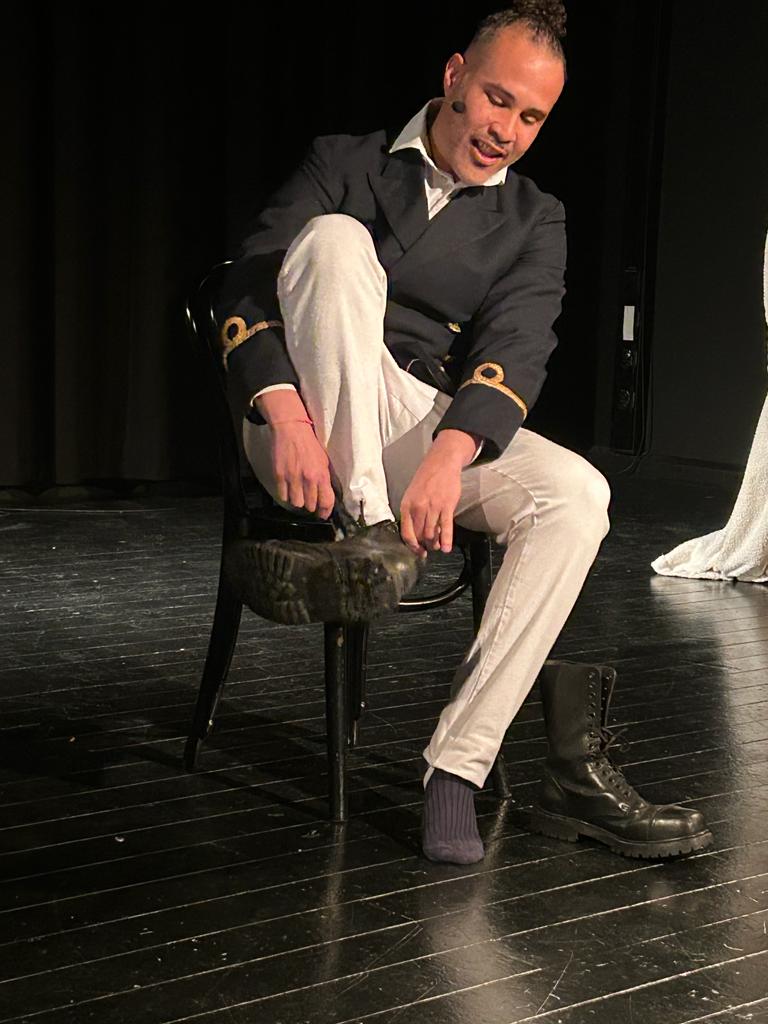
Iury dresses military with every story and has a comment on each accessory that they are not the original ones, but replacements.
Story 1: Salvador, Bahia
I was born in July 1979 during the Brazilian military dictatorship in Rio de Janeiro, Brazil. Though my parents were not living in Rio at the time of my birth, but in Salvador, capital of the state of Bahia, a city located 1600 kilometers away from Rio. They were living there at that time because my father joined the Marine corps at a young age, which meant he was often transferred from one city to another, as he moved up through the ranks over the course of his nearly life-long navy career. That also meant that my father would spend a great deal of time joining military expeditions far away from home and his family. Sometimes for several months at a time.
My parents used to tell me this story: Right before my birth, my mother decided to travel to Rio so that I would be born in the same city where both my parents had been born, adding, in this way, the proud citizenship yet another carioca to the family. That’s what Brazilians call people who are born in Rio de Janeiro: carioca, with a sense of central-southern pride. In order to make the story of my birth even more grandiose, they used to tell me that this was my first plane trip, crossing Brazilian skies some 35.000 feet above the ground in my mother’s womb, just to become a carioca. I used to love this story when I was a kid and spread it widely among my friends in school. But many years later, I learned that this was a one-sided version of the story. Another version is that my mother flew to Rio so that she and I would be assisted by my grandmother and my aunts during the first weeks following my birth, rather than my mother being left alone in Salvador, a city she had just moved to where she didn’t know anyone.
This actually happened. My father was traveling when I was born and got to see me only three days after my birth. I had not been made aware of that though.
It took me 38 years to learn that my father was absent when my mother gave birth to me. She only revealed it when I asked her about the real reason for the trip to Rio de Janeiro. Then she showed me this picture of our first encounter:
This photo tells a story I now have trouble believing: the caring father feeding his baby. What I mostly remember from my early years is his absence.
It is confusing to me why after all these years why I still feel my father’s absence.
And why somewhere deep down I am still looking for his approval.
Until when?
For how long am I going to allow myself to walk in these shoes of oppression?
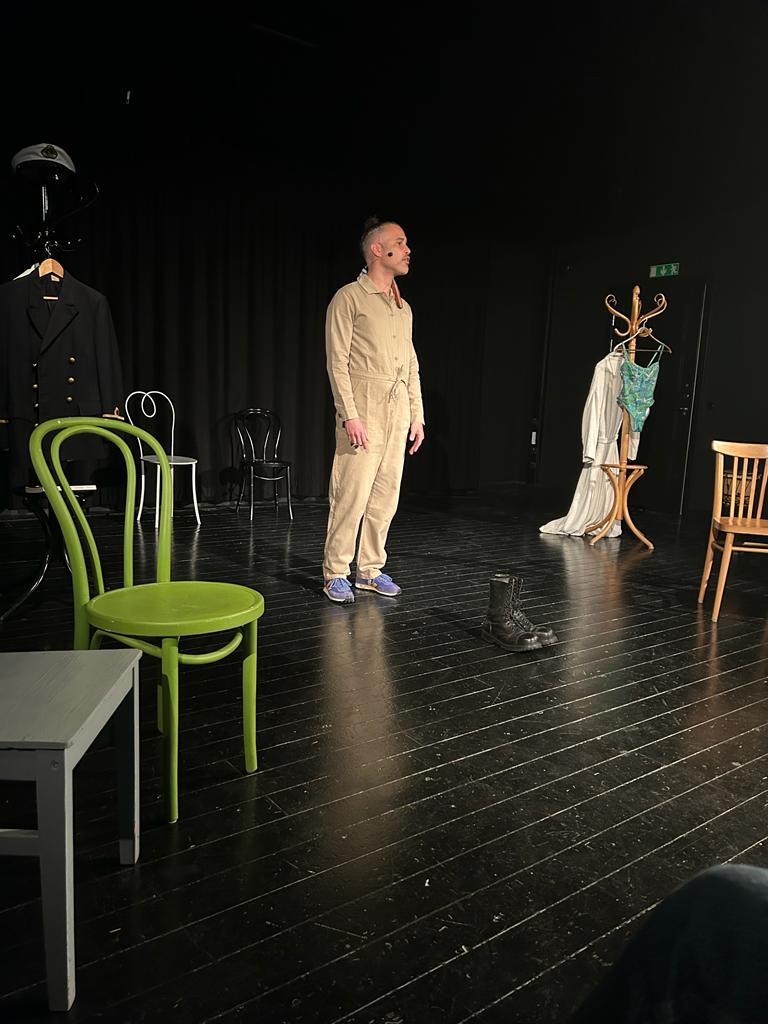
Story 2: Sao Pedro d’Aldeia, Rio de Janeiro
In December 1982, my father was part of the first Brazilian expedition in Antartica, where he spent four long months away from home. I now understand what a great professional achievement it might have been for him. Back then though, for my mother, my brother and I, it was not the happiest of times. It did however provide me with one of my earliest memories: I was 3 years old and I might have been acting a bit strange because my mother kept asking: “What’s going on with you?” I couldn’t reply, I didn’t know. I couldn’t understand my own feelings. That much I remember. After much insistence the only reply I could give was: I miss my father. Yes, despite my strict military upbringing, despite all the chores we had to do every Sunday, such as cleaning the garden, brushing his boots, sweeping the front of the house, washing and polishing both cars etc., despite all those things that I hated so much, those things that kept us from spending Sunday at the beach, I still missed him when he was not around. And he was quite often not around, but involved in military exercises and I remember thinking: what threat are they preparing for? It didn’t seem to me that there was any war to prepare for, and the only threat I remember feeling quite vividly was the possibility of losing my father in a helicopter crash. Every now and then there was a helicopter accident in Sao Pedro D’Aldeia, leaving a military widow and fatherless kids. I still remember one of my classmates, Elson. We were in the 4th grade. One day somebody came to pick him up early from school. Not long afterwards, I heard my mother talking to someone and soon the whole town knew: Elson’s father had been killed in a helicopter crash. That left me sleepless for many nights, thinking my father could be the next.
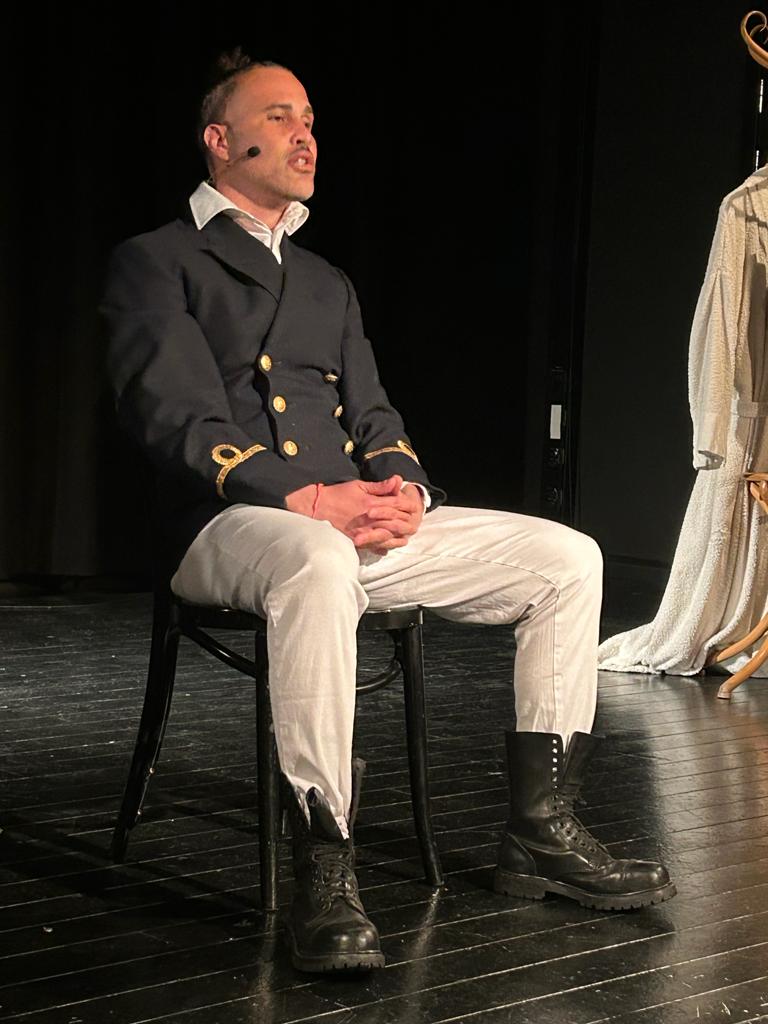
Story 3: Aracaju, Sergipe
It was supposed to be a boat trip. That’s how my father had announced it. My brother and I got very excited. But an alarm bell rang in my head as soon as I saw the boat, which was actually a cargo ship. To my childish eyes, a huge one. I was 11 years old and we were living in Aracaju, located some 300 kilometres away from Salvador. Already at that age, I understood that we wouldn’t be making a Sunday boat trip on a big ship like that. Something smelled off. There was a lot of wind as I watched the coast slowly disappearing. Everybody seemed to be having a good time while all I thought was: When are are we going back? Then something began to appear on the horizon. A black dot that slowly grew larger and larger. My father and the crew started discussing something but I still couldn’t grasp it. Then, right before my eyes, the small black dot became huge: It was an oil platform. I had never seen one before. Then a new announcement was made: the ship is continuing its journey into the open sea, so we have to move onto the platform in order to return to land. Nobody had told me that before. I became very nervous. I couldn’t accept that betrayal. Imagine a crane hoisting a big block of rock from the ground on a construction site. That’s how we were supposed to be transferred from the cargo ship onto the oil platform and then afterwards onto a much smaller ship, that would finally bring us back to land. To safety, as I thought of it. While being hoisted up from the ship by a crane, All I had to hold on to was a thin piece of fishnet placed in front of me. I heard laughter and screams and I did not dare looking down into the ocean. I felt frozen, paralised and betrayed. I was in shock, I would say. To my father though, I preferred to say nothing in order not to awaken his anger.
Didier Eribon’s Returning to Reims excerpt:
“How the traces of what you were as a child, the manner in which you were socialized, persist even when the conditions in which you live as an adult have changed, even when you have worked so hard to keep that past at distance. And so, when you return to the environment from which you came - which you left behind - you are somehow turning back upon yourself, returning to yourself, rediscovering an early self that has been both preserved and denied. Suddenly, in circumstances like these, there rises to the surface of your consciousness everything from which you imagined you had freed yourself and your personality - specifically the discomfort that results from belonging to two different worlds, worlds so far separated from each other that they seem irreconcilable, and yet which coexist in everything that you are. This is a melancholy related to a ‘split habitus’to invoke Bourdieu’s wonderful, powerful concept. Strangely enough, it is precisely at the moment in which you try to get past this diffuse and hidden kind of malaise, to get over it, or when you try at least to allay it a bit, that it pushes even more strongly to the fore, and that's when the melancholy associated with it redoubles its force. The feelings involved have always been there, a fact that you discover or rediscover at this key moment; they were lurking deep inside, doing their work, working on you. Is it ever possible to overcome this malaise, to assuage this melancholy?”
Eribon, Didier. Returning to Reims. Translated by Michael Lucey. Los Angeles: Semiotext(e), p.19
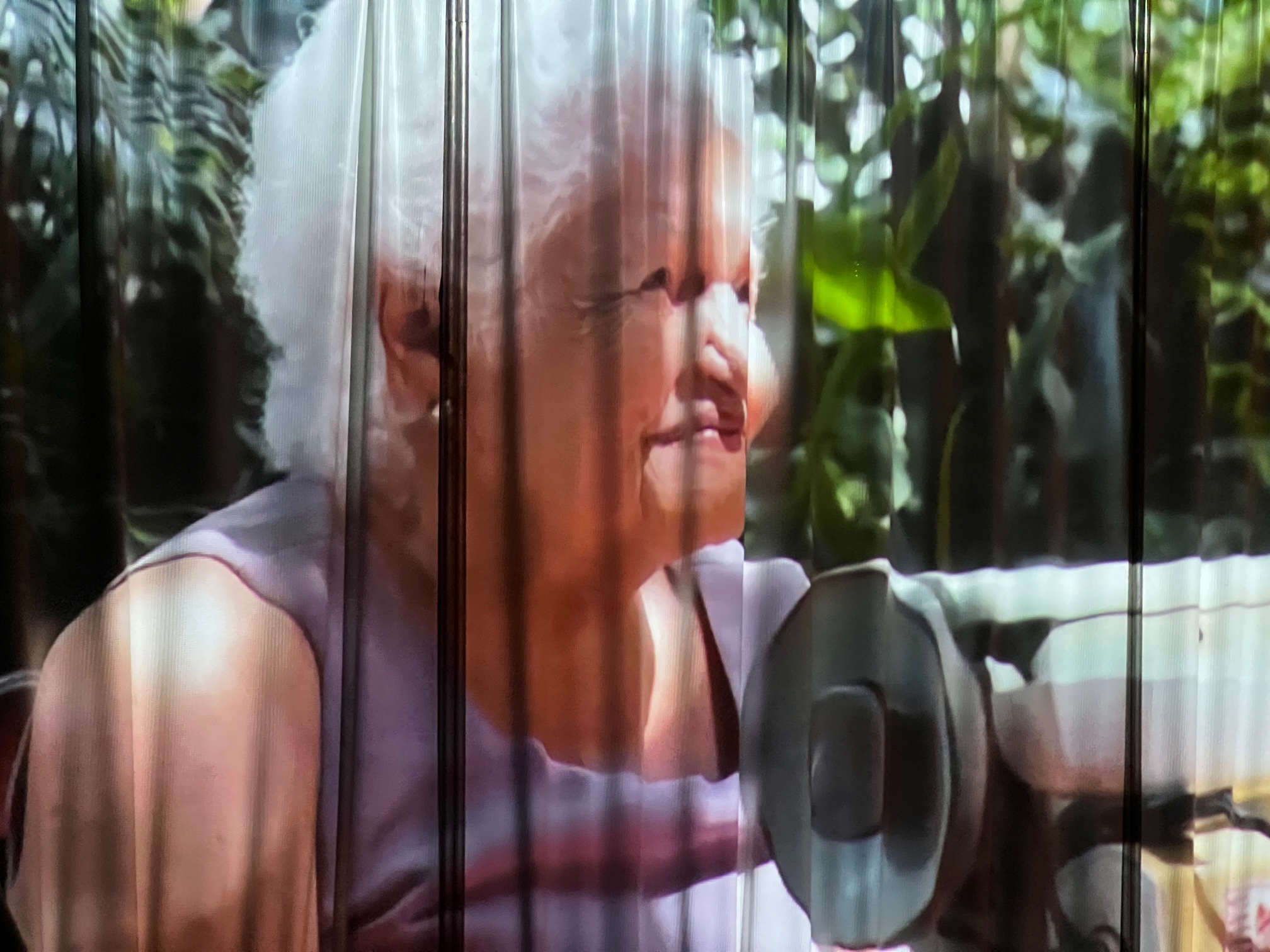
Iury dresses in Voinha’s bathing suit:
Somewhen along the way, I realized how painful and difficult it was to create a performance about the struggles I went through with my father during a depressive crisis. I decided then to turn my attention to my maternal grandmother Voinha, a source of love and inspiration throughout my life. A show initially named Stories of Acceptance (projected) became in the end Feliz Aniversário (Happy Birthday), a celebration of Voinha’s 100th birthday, presented at Hebbel am Ufer Theater in Berlin in November 2020.
In December 2022 I went back to Voinha’s first address in Rio de Janeiro, the same place where we had last met in September 2018. Despite the lack of her bodily presence, I searched for traces of her existence and ways of communicating with her by listening to the environment at my disposition. The recordings of our ancestral exchange were based on the knowledge of the soil, of the flora, of the wind and of one particular memorabilia: Voinha’s ever-present sewing machine.
Voinha was the first person I met who seemed to exhale a sense of freedom and self-control by not allowing anyone to subjugate her. Already from an early age I longed to be free the way Voinha was. Her mixture of a strong-willed and independent personality with an extremely loving and caring presence was an example for me. Voinha was the first non-binary person I met.
Muito obrigade, Voinha. For showing me a way out.
Iury bathes herself in a bathtub.
Video: Quintal de Voinha, by Hilnando, Iury and Lucas Martins
Needless to say my father never responded to my request, so now I am having to make do with replicas of family tokens.
Five years later, I am still trying to tell these stories in order understand my father and, consequently, myself. Maybe I never will. But I keep on trying.
I am my father, but I am also my grandmother Voinha. I am many others who have crossed my different paths along this long journey of migration.
As the genesis of this performance has now taken more than five years, maybe I will need other five to conclude it. Or even fifty and, who knows, five hundred years and a million other stories.
So, Salvador, Sao Pedro d’Aldeia, Rio de Janeiro, Aracaju, Doha, Salzburg, München, Frankfurt am Main, Berlin, Copenhagen and now Malmö are not only the cities where I’ve lived, but also where I have gathered experiences. Experiences that keep pushing me forward.
Off I go.
Iury and Thiago perform the song Maranhao together.
The End
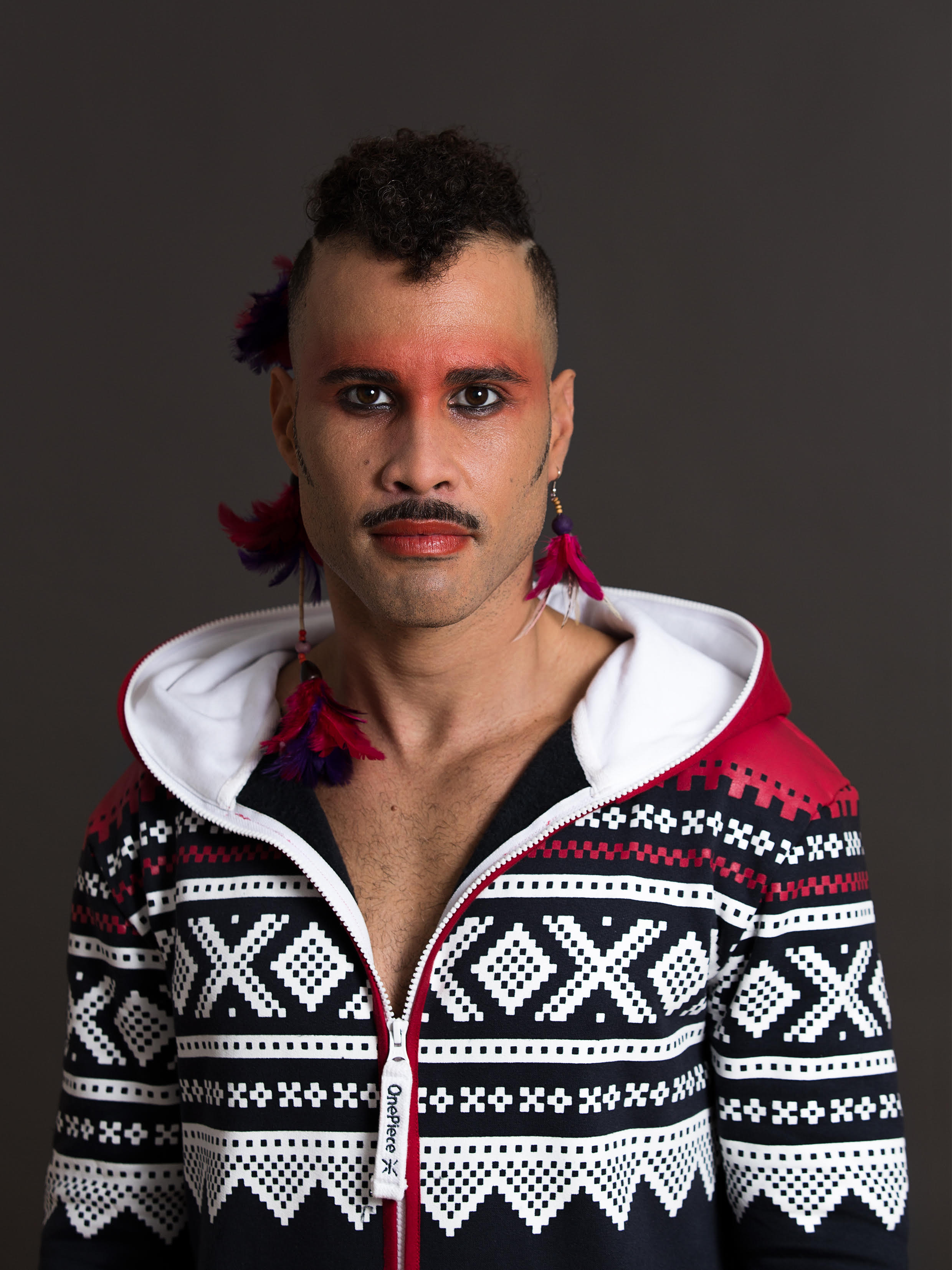
My current practice as an artist researcher is a consequence of the different educational paths I followed, paths very much informed by a desire of not belonging to rigid epistemological structures and by an attempt to investigate methodologies that contemplate the performative as an arena to deal with the crossing of specific issues related to gender, sexuality, racialization, class and ableism, present in my body and in its relation to the different societies that I have inhabited throughout the last sixteen years since I left Rio de Janeiro for Doha, Qatar and later moved on to the Northern European cities of Munich, Frankfurt am Main, Copenhagen, Berlin, and Malmö.
I understand the performative as a possibility to generate knowledge through the body and via its interaction with other agents, or as scholar Mark Fleishmann in his article The Difference of Performance as Research states: “…performance constitutes ‘an alterity’ that resists the hegemony of the text in the academy. It is a transgression that seeks to break down the separation of subject and object, of body and mind, and therefore it must be either expunged, silenced or policed by the academy (…) What is required is an honest acceptance that the principle of ‘compossibility’ – fleshes alongside images, sight alongside hearing and touching and feeling and moving – is called for”. By making use of autoethnography as both a dramaturgical methodology and a performative tool, I am searching for ways to dramatize and, in this way, re-tell my own and some of my ancestors’ journeys (currently my maternal grandmother and my father’s). I deposit my belief in the iterative power of performance as means to emancipate and to regenerate those involved in such processes.
Iury Salustiano Trojaborg is an interdisciplinary, queer, non-binary, migrant artist who has worked practically and theoretically in Theatre, Performance, Dance and Opera.